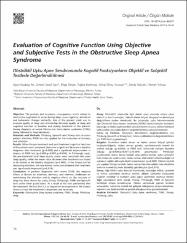Evaluation of cognitive function using objective and subjective tests in the obstructive sleep apnea syndrome

Göster/
Erişim
info:eu-repo/semantics/openAccessTarih
2017Yazar
Ak, Aysin KısabaySarı, Ümmü Serpil
Oktan, Bilge
Korkmaz, Tuğba
Horasan, Gönül Dinç
Selçuki, Deniz
Yılmaz, Hikmet
Üst veri
Tüm öğe kaydını gösterÖzet
"Objective: The primary and secondary consequences which related to obstructive respiration to occur during sleep cause cognitive, emotional and behavioral changes indirectly. Aim of the present study was to evaluate quality of sleep and relationship between quality of sleep and cognitive function at baseline and during treatment in the patients having diagnosis of severe Obstructive Sleep Apnea syndrome (OSAS) being followed in sleep laboratory. Materials and Methods: Pittsburg, Epworth and Stroop tests to assess patient attention; P300 test was applied for the evaluation of memory and attention. Results: When the pre-treatment and post-treatment cognitive functions of the patients were compared; there was a significant decrease in daytime sleepiness after treatment (p=0.000) and a significant improvement in latency of P300 test (p=0.000-p=0.001-p=0.004). In Pittsburgh study; the pre-treatment total sleep quality scores were consistent with poor sleep quality, while the mean value obtained after treatment was found to be related to the healthy sleepiness (p=0.000). In the Stroop test for measuring attention, the rate of error correction obtained after treatment was significantly improved (p=0.010). Conclusion: In patients diagnosed with severe OSAS; the negative effects of disease on attention, alertness, and memory, challenges on maintaining the attention and its negative effects on the structure of sleep has been shown by using Stroop, Pittsburgh, P300 and Epworth tests unlike other publications. As a result of the tests performed after the treatment, the fact that it is an important development in the disease shows us how the treatment is important and necessary."

















